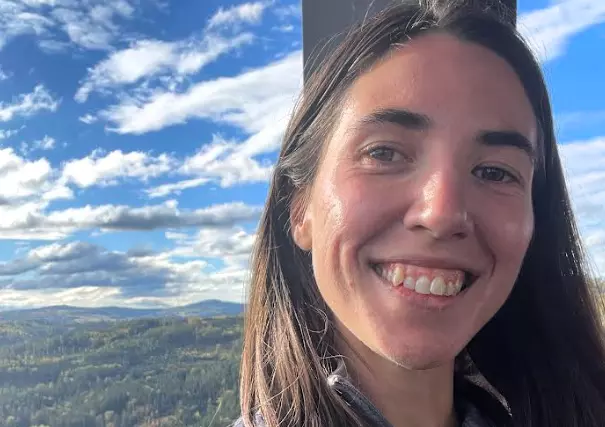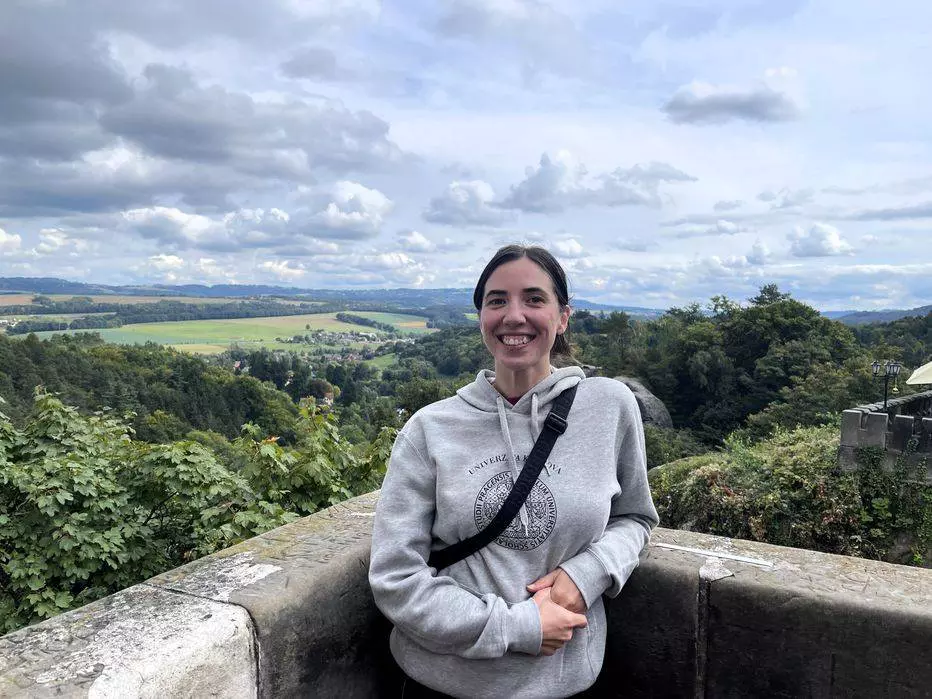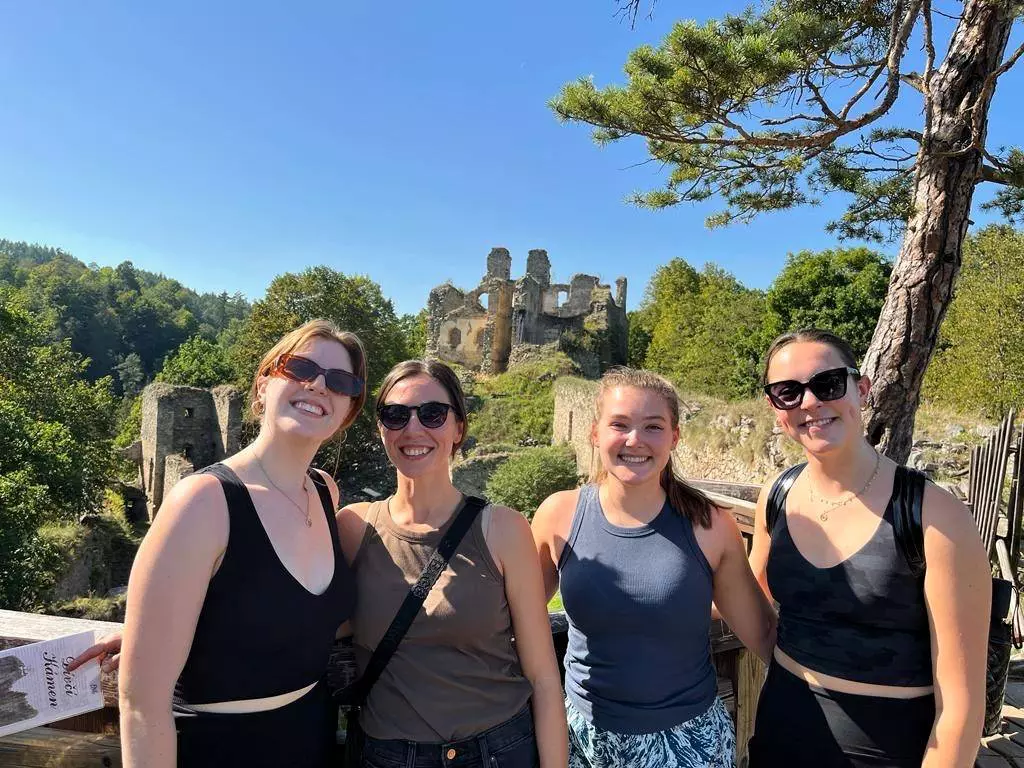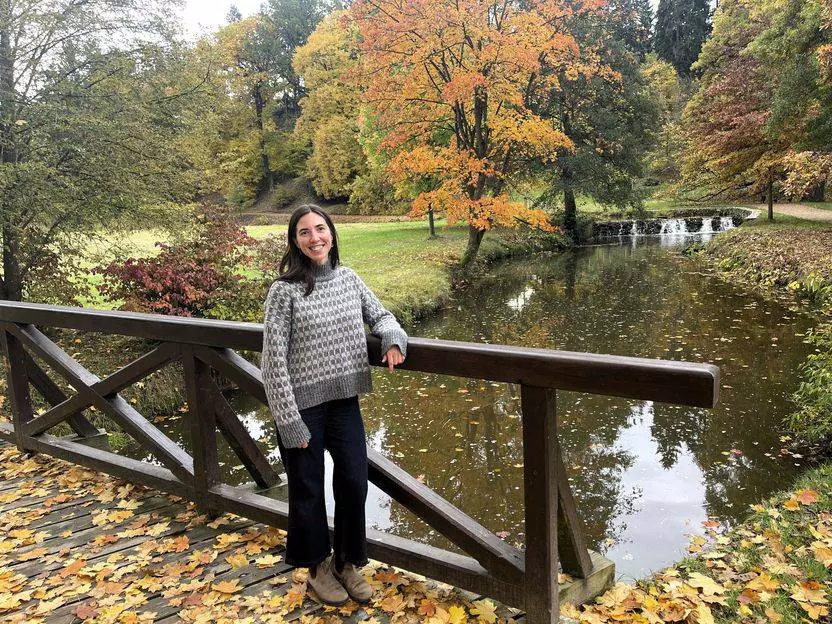
Katelyn Johnson je socioložka a začínající pedagožka. Aby si rozšířila své zkušenosti se vzděláváním na Arkansaské univerzitě ve Fayetteville, tráví podzimní semestr studiem sociologie na Fakultě sociálních věd Univerzity Karlovy v Praze.

Katelyn Johnson
Reflecting on her first time abroad, Katelyn says that: "[S]ociology is focused on studying social structures as well as patterns of behavior within those structures, simply being in a foreign country and culture surrounded by a different language and code of social interactions has felt like one ongoing research project. So, for me, going around the city and meeting new people has been an endless resource."The Benjamin A. Gilman International Scholarship Program is one of the U.S. State Department scholarship programs; it enables students of limited financial means to study or intern abroad in order to provide them with skills critical to U.S. national security and economic prosperity.
This interview is the 29th part of our Fulbright series to celebrate 30 years of the Fulbright Program in the Czech Republic. Interviews are conducted in cooperation with Ladislav Loukota from Vědátor platform. Video recordings of all the live interviews are published on Facebook page on the first Wednesday of every month, and are available on YouTube channel. On Fridays, we offer a written version of the interview on our blog.
In what ways do Czech college courses differ from those in the United States, and what lessons can be drawn from these differences?
The first big difference I noticed is that I am in the classroom fewer times a week here than at home. The same amount of work and attention is expected of you as a student but the teaching style here seems to rely more on self-motivation from the student because the professors here aren’t going to make sure you’re reading every little thing, they just expect you to do the work assigned and be prepared to discuss it. I have had a few teachers with a similar approach in the US but the culture around classroom instruction is clearly a bit different.
As a Fulbrightee, what research opportunities or resources have you found in the Czech Republic that are particularly beneficial to your studies in sociology?
Because sociology is focused on studying social structures as well as patterns of behavior within those structures, simply being in a foreign country and culture surrounded by a different language and code of social interactions has felt like one ongoing research project. So, for me, going around the city and meeting new people has been an endless resource.

Katelyn on a hike in Český ráj, Fall 2023.
Why did you pick the Czech Republic for your foreign stay? Did you consider other alternatives?
The Czech Republic was not actually my first choice when I was considering studying abroad. I was minoring in French language when I first started looking at options, so studying in France was at the top of my list. However, after figuring out a realistic budget for my travels I knew I would have to find somewhere else to study. Prague was a place that I didn’t know much about but as I started to do more research I realized what a wealth of history and beauty was here and the affordability of this destination was a welcome perk.
How was your stay? What surprised you, and on the contrary, what expectations were correct?
My stay has been wonderful! As I already mentioned, price was a big consideration for me as I was largely relying on scholarships to help get me here, but I am so glad that I ended up in Prague, it really felt meant to be. I think that I have been the most surprised with how people interact, or rather, don’t interact with each other in public. The culture between strangers here is very much “keep to yourself.” I know that people aren’t being rude when they don’t say a small “hello” or give a wave as you cross paths, but coming from a small city in Arkansas where these sorts of things are nearly compulsory, it was an adjustment. As far as confirmed expectations go, I was pretty sure that the language barrier would be difficult to overcome and I feel that that holds true. While many people speak English and I can usually order my coffee or a meal with no trouble, it’s more in the everyday immersion that sticks with me. Not being able to read the signs or overhear a conversation (and understand it) builds over time.

Katelyn with friends explore Dívčí kámen, a castle ruin located in South Bohemia, end of Summer 2023.
As an aspiring educator, what approaches to teaching and disseminating knowledge do you find most effective, and how might you adapt them for Czech or American students?
I have found through my own education that any lesson plan that can be applied to or informed by personal experience helps to make the material stick with you. Because of this I am always excited by the sharing of personal experiences in class discussions and would try to encourage that among my own students. Both in classes here in Prague and back home in Arkansas, I have had great conversations with classmates and professors that have broadened my mind and way of thinking about different issues.
In what ways do your experiences and research in the Czech Republic influence your long-term goals in academia?
I think that I will forever be unwinding this experience and folding it into how I interact with others in the world, my students especially. It has given me a wonderful appreciation for difference and the unknown that, because it has enriched my lived experience and educated me, will inevitably be integrated into how I educate others.

Katelyn on a walk in Průhonice park, south of Prague, Fall 2023.
Why do you study sociology? What motivated you to find interest in this particular field?
I actually started my college journey in a physical therapy program, but after the first year I was no longer excited to show up every day and I was feeling unsatisfied with higher education. I would think, “This can’t be what it’s supposed to feel like?” So on a whim, I enrolled in a general sociology course and I have never looked back. I think what drew me in initially was how sociology put a practical language to the passion, as well as the frustration I felt towards social issues in America. My professor was a wonderful and fiercely intelligent woman who would gracefully lead us to understanding by asking deep questions rather than just telling us something she thought we should know. That style to me is real educating.
What is the one thing everybody should know about your field, but you often realize it is not a well known fact?
I think that studying sociology makes you a more empathetic and less passive human being and citizen. I am of the mind that most people are good and that they want themselves and others to be happy and not have to struggle for basic needs. Sociology works to illuminate the structures in our society that either maintain or mitigate these social issues and I have found that when people learn to think past ideology and see the harm that exists in the lives of many they want to do something about it. That motivation towards critical thinking and justice that sociological studies instill is the overlooked fact behind all of the social sciences.
- Autor článku: ne








































